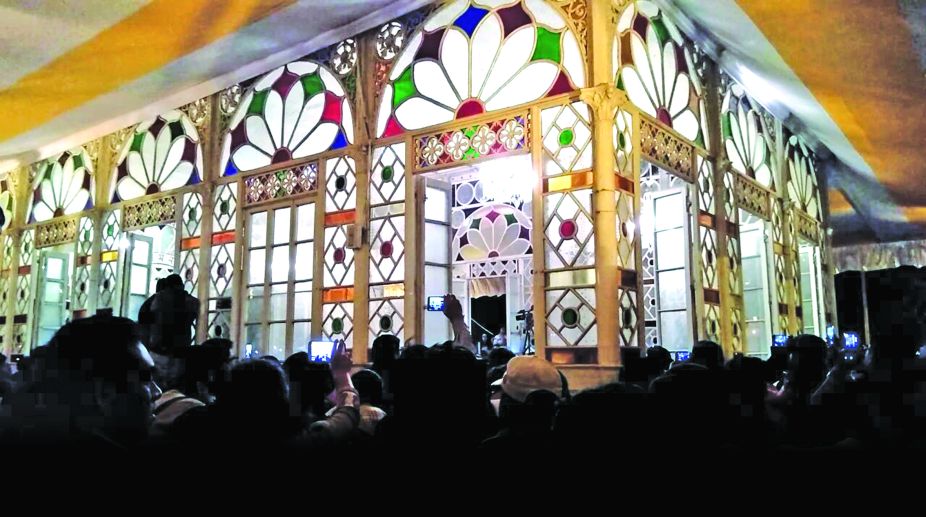Santiniketan beckons us, as always, with disarming charm. Though the red soil of the land has long been usurped by the “promoter raj”, Tagore’s abode attracts tourists even today. People, in hordes, throng the place especially during the festivals held there. The Pous Utsav commences on the seventh day of the month of Pous in the Bengali calendar and is held with much fanfare. This had been the occasion for the past students and ashramites of the area for a gala reunion of sorts. But of late, the Pous Utsav and the accompanying Mela or fair has lost their earlier rural flavour. The early morning programme held at Chatim tala, where Maharshi Devendranath Tagore, Rabindranath’s father, attained enlightenment, kicks off the festival.
This year had hardly been an exception to this rule. Songs and hymns rendered the wintry nip in the morning air, much bearable. Choruses, where both male as well as female voices participated, were enjoyable. The final song, Amar Je Shob Ditey Hobe, pulled the curtain over the morning session. The present vice-chancellor of Visva Bharati University had presided over the entire event. In his address, he reiterated that this year’s event had been a prayer, as it were, against the various inhuman acts that the world over was experiencing at the moment.
The fairgrounds witnessed a record footfall this year. Thousands had travelled from distant corners to purchase the local handicrafts on offer, or to taste the various savoury items of food that some stalls were bartering, obviously for a price. There were pithe of every variety, that sugary, syrupy delicacy which every Bengali is fond of during the season. So, what had started as an essentially local fair with the participation of the nearby tribal villagers has now blossomed into a full-fledged avant garde affair. Boutiques from Kolkata vie for securing a stall at the prestigious fair which will celebrate its centenary year a few years from now. Bursting of crackers, which was an essential feature of the Pous Mela celebrations, has been banned from this year.
Advertisement
From this year, the Mela has been constricted to just six days. Starting from the 23 December, it ideally ends on 28 December. But artisans selling their wares, continue to squat on the grounds, long after the fair has been officially declared as closed. It is within the tradition of the Pous Mela that people sit at the stalls put up by local gourmet eateries, and enjoy hearty lunches amid the winter sun. We had a thali at the stall of Banaphool Caterers. That’s all the fun of the fair. An impromptu eating out, savouring the local delicacies, amid cosy and friendly banter is what the Mela stood for. But sadly it has all but lost this endearing charm. Now-a-days, the fair is a posh event where thousands of people gather just to grab a deal to add ethnic wear to their wardrobes.
Because Christmas coincides with the ongoing Pous Usav, people also attend the function which is organised every year at the “Upasana Ghar” or The Glass House. Innumerable numbers of candles adorn the heritage building and the entire area is lit up to celebrate the occasion. Tagore had composed his poem Shishu Tirtha after having been inspired by a play that he had witnessed in distant Germany. In a small village there, the local villagers used to gather in order to prepare for the production to be staged during Christmas all the year round.
Pous Mela 2017 saw a mammoth crowd hovering in and around the Glass House just to listen and be a part of this unique Christmas celebration. There was the chorus of Kon Alotey Praner Prodip and Ek Din Jara Merechilo along with some of the popular Christmas Carols.
The Pous Mela at Santiniketan attracts people who gather there like fireflies to sources of light. Since the place is the nearest getaway from the city proper, a mere three hour drive, it is crowded during all these festivities. Despite warnings from the administration and security personnel, people disregard all statutes to flaunt the latest in their wardrobes and accessories. For all these reasons and more, the Pous Utsav, with the sole exception of the solemnity of the programme held at Chatim Tala, has become a mere occasion for bartering of goods, handmade and eco-friendly.
But winters in Santiniketan are a delight. Flowers are in bloom. So adorning one’s best winter garments, heading for the Pous Mela and Utsav held there seems to be the best option. But since times are changing and Tagore’s abode can hardly be an exception, the Utsav has all but lost its solemnity. What used to be an affair where only the ashramites and local residents had participated has turned into a mass scale amalgamation of people. The fun and joy of travelling to and from the Pous Utsav has sadly been whisked away by the slow-changing wheels of time.
Advertisement











